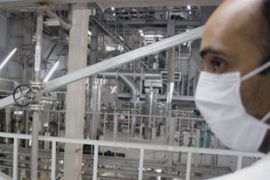Obama calls Hu on Iran sanctions
US president highlights importance of working with China to stop Iranian enrichment.

China has previously been opposed to a new round of UN sanctions, with senior Chinese diplomats to the UN repeatedly saying diplomacy was their preferred route.
Strained relations
The discussion came with relations between Beijing and Washington strained over a range of trade disputes, internet censorship, US arms sales to Taiwan and the US president’s decision to meet the Dalai Lama, Tibet’s spiritual leader.
| in depth | |||||||||||||||||
|
Hu told Obama both sides should “respect each other’s core interests and major concerns and properly handle differences and sensitive issues”.
He said that China and the US should make “unremitting efforts towards co-operative, positive and comprehensive” ties, a Chinese foreign ministry statement said.
“Hu stressed the Taiwan and Tibet issues concern China’s sovereignty, territorial integrity, and China’s core interests, and properly dealing with these issues is key to ensuring the healthy and stable development of Sino-US relations.”
The telephone call came as Iran’s chief nuclear negotiator visited China.
In talks with Saeed Jalili in Beijing, Yang Jiechi, China’s foreign minister “urged all sides to enhance diplomatic efforts and demonstrate flexibility, and to create the conditions for resolving the Iran nuclear issue through dialogue and negotiations”.
However, Jalili told a news conference after the talks that the two countries had agreed that sanctions were “not effective”.
Asked if China supported sanctions on Iran, he said: “It’s up to China to answer that.”
The official IRNA news agency quoted Jalili as saying: “Iranians are familiar with sanctions … We will continue our [nuclear] path more decisively.”
Iran rejects Western charges that its atomic programme is aimed at developing bombs and insists that its nuclear programme is peaceful and intended only to generate electricity.
US officials said on Wednesday that diplomats from the five permanent members of the UN Security Council and Germany, known as the “P5+1” group, were unified on the issue of Iran sanctions.
Applying pressure
Bill Burton, the White House spokesman, said that the international community would seek to “put pressure” on Iran this spring.
| In video |
|
Al Jazeera’s Cath Turner reports on moves |
“We’re going to continue that process and the president thinks that this spring we’re going to be able to be in a place where there’s an agreement of those nations to apply real pressure to Iran,” he said.
China’s support, or at least acquiescence, is crucial to securing a new round of sanctions as it is a permanent member of the Security Council with the power to veto any resolution.
But Al Jazeera’s Cath Turner, reporting from the UN headquarters in New York, said the major powers had only agreed to compile a list of possible sanctions to be discussed before a draft resolution is draw up and presented for vote at the security council.
“Looking very closely at what has been agreed on, there is a long way to go until China is supposed to be supporting a new draft resolution for sanctions on Iran,” she said.
“We need to be very careful that we don’t buy into the American language of optimism and trumpeting some kind of breakthrough when really, it’s only a very small step on a very long way to sanctions against Iran.”
Energy supplier
Some analysts say China will push to ensure any possible sanctions do not threaten its energy and trade ties with Iran.
In 2009 Iran was the third-biggest foreign supplier of crude oil to China, which is the world’s second-biggest consumer of oil after the US.
A US draft proposal agreed with its European allies and passed on to Russia and China a month ago will form the basis of discussions on new sanctions.
It targets Iran’s Revolutionary Guard, shipping and other firms, but not Iran’s oil and gas sectors.
Russia, like China, reluctantly backed three previous rounds of UN sanctions against Iran for refusing to halt uranium enrichment as demanded by five Security Council resolutions.
